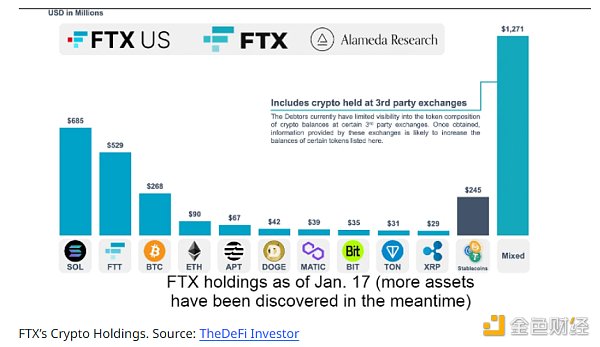Will FTX liquidating $3.4 billion worth of crypto assets become the main culprit behind the market crash?
Will FTX's $3.4 billion crypto asset liquidation cause the market crash?For FTX’s legal team, this week will be a busy one as they seek approval from regulatory authorities to liquidate $3.4 billion worth of cryptocurrencies in order to return funds to creditors in cash/fiat form. A Delaware bankruptcy judge plans to hold a court hearing on September 13th to discuss the liquidation plan.
Due to concerns about selling pressure, Bitcoin briefly fell below $25,000 during Monday’s US stock trading session, marking the first time in nearly three months. Ethereum, the second-largest cryptocurrency by market capitalization, fell 3.2% on the day, trading at $1,560.
Altcoins performed worse, with Solana’s SOL falling more than 8%. Toncoin’s TON and Layer 2 Arbitrum’s ARB saw similar declines, while Ripple’s XRP fell 5%.
What cryptocurrencies does FTX hold?
- Analyzing MEV on Friend.tech How is it executed? How is the profit made?
- SevenX Ventures Modular Smart Contract Account Architecture and Challenges
- Singapore vs Hong Kong TOKEN2049 ignites the battle of the twin cities in Web3
According to an updated FTX shareholder report as of September 11th, FTX has assets totaling over $7 billion, including digital assets, cash, brokerage investments, venture capital portfolios, tokens, and real estate. The company owns 38 properties in the Bahamas with a book value of $222 million.

As of August 31st, FTX (including FTX.com, FTX.US, Alameda) collectively held approximately $3.4 billion worth of cryptocurrencies based on market prices. In order of position value, they are as follows: 1. SOL, with a position value of approximately $1.162 billion; 2. BTC, with a position value of approximately $560 million; 3. ETH, with a position value of approximately $192 million; 4. APT, with a position value of approximately $137 million; 5. USDT, with a position value of approximately $120 million; 6. XRP, with a position value of approximately $119 million; 7. BIT, with a position value of approximately $49 million; 8. STG, with a position value of approximately $46 million; 9. WBTC, with a position value of approximately $41 million; 10. WETH, with a position value of approximately $37 million. These top 10 coins account for 72% of FTX’s total cryptocurrency holdings, while the remaining 28% is comprised of over 400 other altcoins.
The proposal to sell assets was first introduced in August and will involve hiring Mike Novogratz’s Galaxy Digital as the investment firm responsible for the sale. Under the plan, FTX will be allowed to sell up to $100 million worth of tokens per week, with the possibility of increasing the cap to $200 million.
What will be the impact on the market?
In its market report on Monday, Singaporean digital asset service provider Matrixport stated that a “shitcoin collapse is imminent” as FTX could potentially start selling tokens as early as this week.
Evgen Verzun, the founder of multi-chain asset management platform Kaizen.Finance, said, “We have seen similar large-scale sell-offs in the past, including the recent selling event by Vitalik Buterin, which had a significant impact on the cryptocurrency market. We even noticed capital withdrawals before the sell-off began. This time will be no different, and I expect the market to follow suit: we will see a decline before the sell-off begins.”
IntoTheBlock emphasizes that the imminent FTX liquidation could hinder the positive progress of Ethereum and Solana. The company commented, “Despite positive news about Visa and the potential ETH ETF spot, FTX’s upcoming $3 billion liquidation could determine market trends.”
But other market observers see the sell-off differently.
Messari posted on social media that what needs to be observed is not the absolute value of the tokens held by FTX, but the amount relative to the active trading volume of each asset. For example, FTX/Alameda’s BTC holdings ($353 million) account for about 1% of BTC’s weekly trading volume, which means that the market can absorb most of the sell-off, and the same goes for ETH. Messari stated that for assets with poor liquidity such as DOGE, TRX, and MATIC, the amount held by FTX accounts for 6-12% of the weekly trading volume, which has a much greater impact on the market. Although SOL and APT have a considerable dollar value and relative market capacity, these assets are held by Alameda and venture capitalists and are mainly composed of ownership tokens that cannot be immediately liquid on the public market. Only 9.2 million SOL is unlocked each month, significantly reducing the impact of liquidation and making it more manageable, similar to BTC and ETH liquidation.
Other market observers expressed similar views. RR2 Capital trader Crypto Rand pointed out that SOL tokens will not be locked in a vesting schedule until as early as 2025. Potential buyers can purchase SOL for sale but must comply with the vesting schedule, which will not affect the short-term price.
André Dragosch, Head of Deutsche Digitale Asset Research, said in an interview with The Block that the final liquidation of FTX may already be largely reflected in the price, but there is still significant uncertainty about the cryptocurrencies held by FTX on third-party exchanges. Dragosch emphasized that the potential FTX sell-off, combined with other relatively bearish indicators, may amplify the downward pressure on Bitcoin, noting that on-chain data shows a decline in Bitcoin spot and derivative trading volumes.
Panic may still be premature, as noted by renowned crypto commentator Hitesh.eth in a tweet, even if the FTX liquidation is approved on September 13, the liquidation may not start immediately.
FTX Relaunch: FTX 2.0
A document obtained by Fortune magazine indicates that there is still a possibility of FTX resuming operations in some form through a relaunch. The document states that since May, over 75 potential bidders have been in contact with FTX regarding the relaunch, after the idea was “marketed” by the debtors. Bidders for “FTX 2.0” must decide whether to make modifications by September 24.
The document states, “Proposals are being evaluated. The timing of the transaction will depend on the nature of the transaction, the preparedness of the bidders, and other considerations.”
Matthew Gold, a partner at law firm Kleinberg Kaplan, stated on social media that restructuring or financial restructuring in the cryptocurrency industry is particularly rare after bankruptcy. The possibility of a relaunch depends on whether the “major creditors” agree to proceed and whether the proposal is supported by a majority vote of the creditors.
Author: LianGuaiBitpushNews Mary Liu
To learn more information, please join:
LianGuai Twitter: https://twitter.com/BitpushNewsCN
LianGuai TG Community: https://t.me/BitPushCommunity
LianGuai TG Subscription: https://t.me/bitpush
This article is from LianGuai: https://www.bitpush.news/articles/5058362, please indicate the source when reposting
We will continue to update Blocking; if you have any questions or suggestions, please contact us!
Was this article helpful?
93 out of 132 found this helpful
Related articles
- Sovereignty vs Society The Contradictory Relationship Between Individual Freedom and Social Dependence
- How to Prove a Secret A Guide to Zero-Knowledge Proofs from Magicians
- Dune SQL and Ethereum Data Analysis Advanced Guide
- The Core Function of Data Availability in Layer2
- Consensys Global Survey How is Web3 perceived around the world?
- Understanding the Account Abstraction That Determines the Future of Web3 in One Article
- CertiK Security Report Nearly 1 billion USD will be stolen in 2023 due to fraud, vulnerability exploitation, and hacker attacks.






